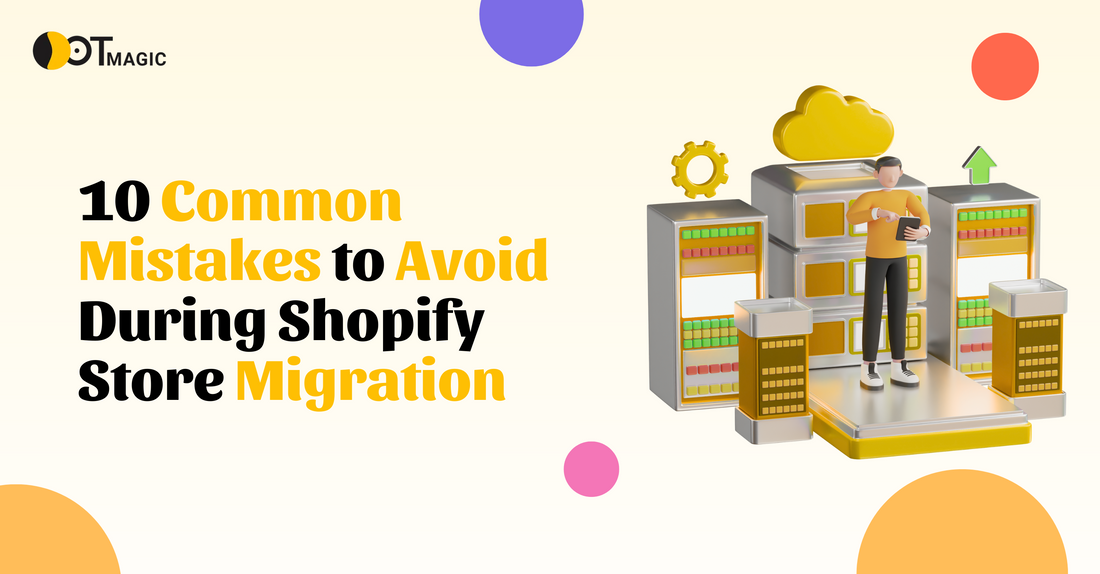10 Common Mistakes to Avoid During Shopify Store Migration

Introduction
For your ecommerce business in 2025, moving to Shopify might be one of the best things you can do if you’re not careful, it could also be your worst. Whether you are transitioning from Magento, WooCommerce, BigCommerce, or a homegrown platform, Shopify migration errors can really come back to bite you in your copy (or cash, or customer happiness, or SEO). Opting for most suitable Shopify Migration Services becomes a need of the hour so that you can switch efficiently and carry on with the store’s functionality.
In this article, we’ll walk you through the top 10 Shopify store migration mistakes to avoid, based on real-world experience with Indian and international brands. If you’re planning to migrate to Shopify, this is your checklist.
Top Mistakes to Avoid During Shopify Store Migration
1. Not Creating a Pre-Migration Backup
Mistake: Failing to back up your existing website before starting migration.
Fix: Export your full product, customer, order, and CMS database. Take backups of media, SEO meta data, and page URLs.
2. Ignoring 301 Redirects for SEO
Mistake: Skipping URL redirection causes lost traffic and broken links.
Fix: Create a 301 redirect map that points every old URL (e.g., /products/blue-jeans) to its new Shopify equivalent. This preserves SEO equity.
3. Migrating Without SEO Strategy
Mistake: Overlooking your metadata, headings, or alt tags.
Fix: Migrate your meta titles, descriptions, H1 tags, and image ALT text carefully. Shopify makes SEO easy use it from day one.
4. Choosing the Wrong Shopify Plan
Mistake: Picking Basic Shopify when you need Shopify Plus or vice versa.
Fix: Understand your traffic volume, app needs, B2B features, and growth goals. Get expert help choosing the right plan.
5. Not Testing Before Launch
Mistake: Launching your Shopify site without testing functionality.
Fix: Test your full store before going live: product filters, checkout, app integrations, mobile responsiveness, and speed.
6. Failing to Migrate Complete Data
Mistake: Missing product variants, customer history, or reviews.
Fix: Use migration tools or experts to ensure full data transfer including images, tags, collections, reviews, orders, and inventory.
7. Forgetting Custom Features & Integrations
Mistake: Assuming Shopify has identical features or apps to your old platform.
Fix: Rebuild or replace custom logic with Shopify apps or custom development. Plan for integrations like CRMs, ERPs, or email tools.
8. Using Poorly Optimized Themes
Mistake: Choosing a bloated or slow theme just for design.
Fix: Use fast, lightweight, mobile-first Shopify themes (like Dawn or Prestige). Speed directly impacts UX and conversions.
9. Launching Without Analytics & Tag Setup
Mistake: No GA4, Meta Pixel, or conversion tracking at launch.
Fix: Install Google Analytics, Meta Pixel, Google Tag Manager, and set up Shopify’s built-in reporting before going live.
10. No Post-Migration Monitoring
Mistake: Assuming everything works perfectly after launch.
Fix: Monitor traffic, bounce rate, 404 errors, and conversions. Set up alerts in Google Search Console and Shopify Admin.
👉 Magento to Shopify Migration Services | Switch to Shopify 2025
Bonus Tips for a Smooth Shopify Migration
- Use tools like Matrixify or LitExtension for large-scale migrations.
- Keep your old domain connected to the new Shopify store for continuity.
- Use staging environment before switching DNS or going live.
- Migrate blog content and set up Shopify Blog categories correctly.
- Inform your customers via email about the new store experience.
Shopify Migration Doesn’t Have to Be Risky
By avoiding the above 10 mistakes, your Shopify migration can be:
- SEO-friendly
- Error-free
- Performance-optimized
- Launch-ready in under 3 - 4 weeks
And with the right development partner, even complex migrations from Magento, WooCommerce, or custom builds can be fast and painless.
Why Brands Trust Dotmagic Infotech for Shopify Migrations
At Dotmagic Infotech, we specialize in seamless Shopify store migrations for Indian and global businesses. Our team ensures:
- Zero data loss
- Complete SEO preservation
- Store rebuild or redesign
- Post-launch support and performance optimization
✅ Get a Free Shopify Migration Consultation
✅ See Shopify Migration Case Studies
FAQs
Q. How long does Shopify migration take?
Most projects take 2–4 weeks depending on store size and custom features.
Q. Will I lose my Google rankings during migration?
Not if proper 301 redirects and SEO transfers are done. We ensure this.
Q. Can I migrate just part of my store to Shopify?
Yes. We can migrate in phases or launch as a hybrid setup during transition.
Dotmagic Infotech
Expert Team
Related Articles
Stay Updated
we specialize in Shopify Development and custom PHP solutions to build stores that meet your business goals and deliver a great user experience.
Get in Touch


